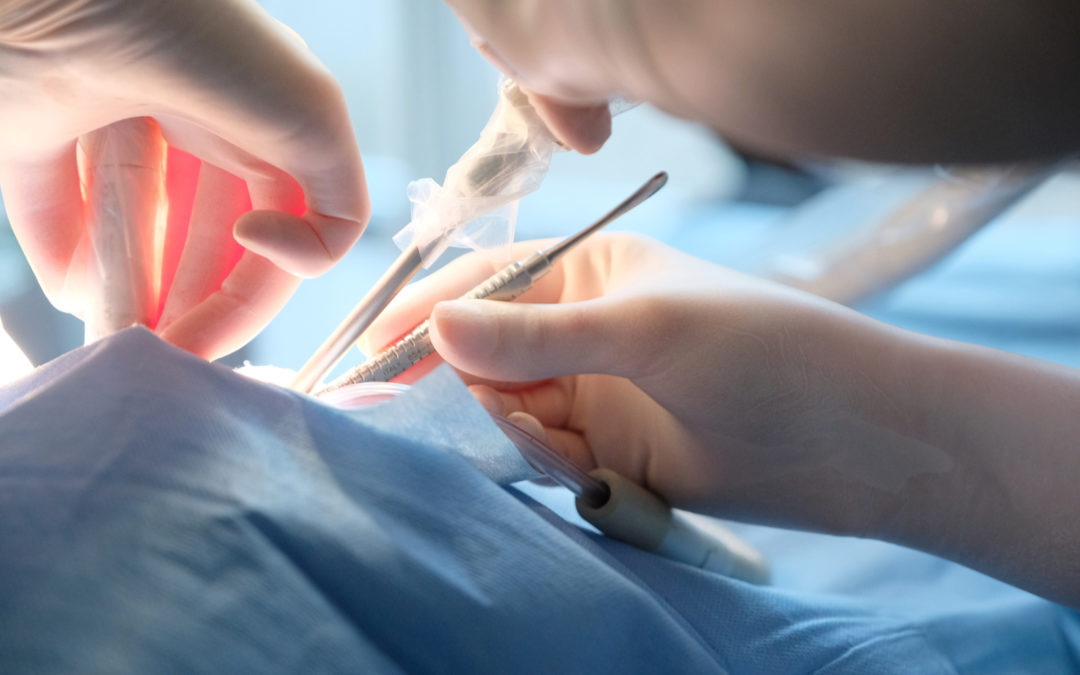If you’re like most people, it’s safe to assume you would prefer non-surgical treatment options when going to the dentist for a dental problem whenever possible. However, non-surgical dental treatment does have its limitations. In some cases, surgery may be your best option for fully restoring your periodontal health if the treatments and related non-surgical interventions discussed below fail to produce the intended results.
Scaling and Root Planning
Also referred to as conventional periodontal therapy, scaling and root planning is a non-surgical treatment that’s typically done to prevent gum disease. It’s a two-part deep cleaning process that involves removing plaque and tartar, which is hardened plaque.
The first phase of the thorough cleaning goes from your teeth all the way down to places that cannot be accessed by normal cleaning devices, such as the area around the root below the gumline. If you have early issues with gum disease, your space may develop around your teeth. These spaces are called periodontal pockets.
The “scaling” is performed with an ultrasonic cleaning device to remove accumulated plaque and tartar from around your teeth. The purpose of doing so is to prevent pockets from getting deeper.
The second phase is the planning part. This means your teeth roots are smoothed out. This is done to help your gums attach themselves to your teeth again. Some patients benefit from the use of a local anesthetic during this non-surgical procedure.
Scaling and Root Planning Aftercare
You may have increased tooth sensitivity for a few days after having a deep dental cleaning. Your gums may also be temporarily tender or swollen. Medication may be prescribed to prevent infection, or you may be advised to use a mouth rinse. Certain types of medication can be inserted directly into the pockets that were cleaned.
A follow-up visit will be scheduled after your initial treatment to make sure your gums have sufficiently healed. The depth of the pockets is also checked.
Ongoing Maintenance Therapy
After this treatment, you may not require further treatment other than normal dental checkouts, which the American Dental Association recommends twice a year. However, many patients do require ongoing maintenance therapy to keep their teeth and gums healthy.
Lifestyle Improvements
There are many lifestyle adjustments or improvements that can also be considered non-surgical dental treatments in the sense that they could help prevent serious problems from developing. A healthy diet, for example, that includes minimizing your consumption of sugary snacks and beverages reduces your risk of developing cavities and similar dental issues. Some other lifestyle improvements that could reduce your need for dental surgery include:
• Avoiding tobacco products
• Brushing and flossing daily
• Having regular dental checkups
• Using mouth guards and similar protective devices if you are involved with contact sports
The good news is many minor dental problems tend to respond well to non-surgical treatment. Even if surgery is necessary given your circumstances, take comfort in knowing many of the techniques used today are as minimally invasive as possible. Contact us today to learn more.
 Dr. Ana Pesaturo earned her Masters Degrees in Healthcare and Business administration from the University San Martin of Colombia South America in 1991. She then completed her Advanced General Esthetic Dentistry residency program at the Community Smiles Dental Research Clinic in Miami, Florida, and her General Hospital Dentistry residency at Miami Valley Hospital in Ohio State. Dr. Pesaturo currently works as a private dentist in the Miami area and as a dental consultant in healthcare management. Read more at https://anapesaturo.com/about/meet-dr-pesaturo/
Dr. Ana Pesaturo earned her Masters Degrees in Healthcare and Business administration from the University San Martin of Colombia South America in 1991. She then completed her Advanced General Esthetic Dentistry residency program at the Community Smiles Dental Research Clinic in Miami, Florida, and her General Hospital Dentistry residency at Miami Valley Hospital in Ohio State. Dr. Pesaturo currently works as a private dentist in the Miami area and as a dental consultant in healthcare management. Read more at https://anapesaturo.com/about/meet-dr-pesaturo/

